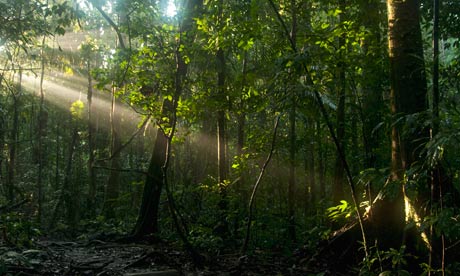Wildlife at risk as Amazon tribes come under threat from oil exploration
The loss of the Tagaeri and Taromenane tribes would add immense pressure on wildlife, conservationists say
- guardian.co.uk, Monday 3 September 2012 13.28 BST

Two of the world’s last uncontacted tribes are under threat from oil exploration deep into the heart of the Amazon forest in Ecuador, according to conservationists, who say this may indirectly add to the pressure on wildlife.
The Tagaeri and the Taromenane, who have fought off illegal loggers and Catholic missionaries with spears and blowpipes to maintain their isolated, nomadic existence are now at risk from the construction of roads and drilling wells as petroleum firms carve up the Yasuni national park.
Scientists believe Yasuni is the most biodiverse place on Earth and large swaths of the park remain in pristine condition thanks partly to the ferocity of the indigenous people’s resistance to intruders.
That is changing. Although their rights are recognised by the country’s constitution, their existence has been largely ignored by government authorities responsible for drawing up the boundaries for development, say researchers who have studied their interaction with often-violent and lawless frontiers of globalisation.
The Taromenane – known locally as the “red feet” are thought to be offshoots of the Huaorani, who speak the same language but have suffered a very different fate. The Huaorani – which means “human being” – also used to be almost entirely carnivorous nomads and fearsome defenders of their rainforest home. They resisted contact until 1958, but now most are settled, often around oil well communities with whom they have a parasitic relationship. Carlos Andrés Vera, the director of a documentary about the the uncontacted tribes, says the Huaorani take money from the petroleum companies in return for a promise not to attack. “They may do a show and dance naked, but it’s basically extortion. I don’t blame them. The Huaorani have learned about citizenship from Ecuador’s mafia: the army, oil firms and illegal loggers.” The Huaorani and uncontacted tribes have also lost much of their territory to other tribes that were quicker to embrace modernity and strikes land deals with the authorities. The Kichwa indigenous group have moved from spears and blowpipes to guns and eco-tourism within three generations. They say the other tribes chose isolation. “We call them savages,” said Silvana Tangoy, a Kichwa guide who performs traditional dances for visiting tourists. “We tried to get in touch with them, but they responded with spears so we leave them now. That’s fine. They can do what they want in the park. They don’t want to be civilised.” The issues of the tribes is compounded by political sensitivities and the polarisation of opinion between those who call them violent savages and want to seize their land and those who feel they are vulnerable and can do no wrong.
The zoologist Rob Wiliams, who is one of the few people to have seen members of the uncontacted tribes, says franker discussions with and about indigenous people forced into transition are vital because once tribes have access to roads, guns and healthcare, their numbers grow rapidly and so does their impact on other species.
“With a bow and arrow, it was hard to kill an animal like the tapir, but now it’s easy. That’s why we are seeing overhunting and falling densities of wildlife,” said Williams, a representative of the Frankfurt Zoological Society. “The biggest conservation issue in the Amazon is the indigenous people in protected areas, but no one wants to talk about it.”
